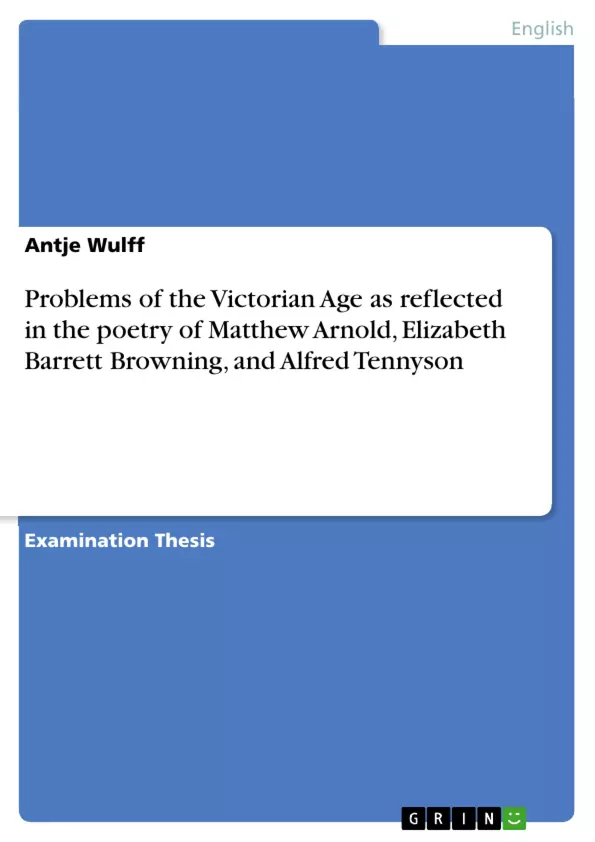The Victorian age was a time of change, and of a change as far-reaching and comprehensive as it had hardly ever been encountered before. This change rang in Britain’s heyday, it led the country straight into modernity and transformed virtually every area of life. On the Victorians, it had a twofold effect: Regarding themselves as the vanguard of progress, they celebrated their achievements with an almost evangelical optimism, while at the same time, the loss of traditional values and beliefs triggered new fears and insecurities as well. This thesis tries to approach the ambivalent nature of the age by studying the poetry.of Matthew Arnold, Elizabeth Barrett Browning, and the poet laureate Alfred (Lord) Tennyson. Though naturally not intended as a compendium of all the difficulties of Victorian Britain, it traces the predominant predicaments of the age – namely socio-economic and political issues and the effects of “progress” on the inner consciousness of the individual human being – and analyses the way they are presented by the three poets, be it overtly or covertly. An interdisciplinary approach is taken where it seems appropriate, although generally, the poems themselves provide the basis for comment and analysis. They are individual, but also exemplary reactions to the historical environment from which they emerged, and as such, they can contribute to a better understanding of both this environment and the interrelation between man and the forces of history in general.
Table of Contents
- Introduction
- High Hopes? – The Ambivalence of Victorian Optimism
- The New Queen
- Trade and Industry - Roads to Utopia?
- An Imperial Vision. “To Strive, to Seek,...and not to Yield”?
- Dangers to the Nation
- Dangers from Within
- The Social Disease
- People in Their Place
- Capitalist Jungles
- Searching for a Cure
- Raising Bodies and Souls – The Message of “Aurora Leigh”
- "Not Swift nor Slow to Change, but Firm” – Tennyson's Policy of Gradation
- Dangers from Without
- The Social Disease
- Fears of the Individual
- The Religious Crisis
- The Advancement of Victorian Science
- Between Faith and Doubt
- "Wandering Between Two Worlds" – Patterns of Nostalgia and Retreat
- Nostalgia
- Retreat
- The Identity Crisis
- The Buried Self
- Breakdown of Communications
- Disintegration of the Individual
- The Religious Crisis
Objectives and Key Themes
This essay aims to examine how the problems of the Victorian age are reflected in the poetry of Matthew Arnold, Elizabeth Barrett Browning, and Alfred Tennyson. It explores the complexities of this era, highlighting the inherent contradictions within Victorian society, particularly the tension between optimistic progress and underlying anxieties.- Victorian Optimism and its Limitations
- Social and Economic Problems within Victorian England
- Religious Crisis and the Rise of Science
- Nostalgia and Retreat in the Face of Modernity
- The Identity Crisis and the Fragmentation of the Individual
Chapter Summaries
The essay begins by introducing the Victorian era as a time of significant change and transition, marked by advancements in science, technology, and industry. It then explores the prevailing optimism of the era, focusing on poems by Tennyson that embody the official doctrine of the time. The third chapter delves into the social and economic issues prevalent in Victorian Britain, analyzing poems by Barrett Browning and Tennyson that address both internal and external threats to the stability of the nation. The final chapter focuses on the impact of these developments on the individual, examining the religious crisis, the rise of science, and its influence on the perception of the world, the self, and relationships. The chapter explores the themes of nostalgia, retreat, and the fragmentation of identity, drawing on poems by Tennyson and Arnold.Keywords
Victorian poetry, Matthew Arnold, Elizabeth Barrett Browning, Alfred Tennyson, optimism, progress, social problems, economic inequality, religious crisis, science, identity, nostalgia, retreat, fragmentation, interdisciplinary approach. - Dangers from Within
- Quote paper
- Antje Wulff (Author), 2003, Problems of the Victorian Age as reflected in the poetry of Matthew Arnold, Elizabeth Barrett Browning, and Alfred Tennyson, Munich, GRIN Verlag, https://www.grin.com/document/118027



